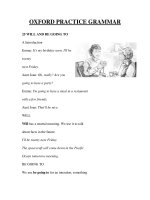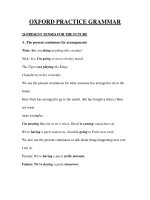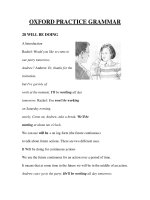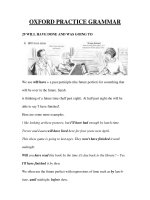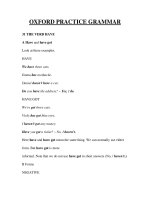Tài liệu OXFORD PRACTICE GRAMMAR 28 docx
Bạn đang xem bản rút gọn của tài liệu. Xem và tải ngay bản đầy đủ của tài liệu tại đây (137.62 KB, 6 trang )
OXFORD PRACTICE GRAMMAR
28 WILL BE DOING
A Introduction
Rachel: Would you like to come to
our party tomorrow,
Andrew? Andrew: Er, thanks for the
invitation,
but I've got lots of
work at the moment. I'll be working all day
tomorrow. Rachel: You won't be working
on Saturday evening,
surely. Come on, Andrew, take a break. We'll be
starting at about ten o'clock.
We can use will be + an ing-form (the future continuous)
to talk about future actions. There are two different uses.
B Will be doing for continuous actions
We use the future continuous for an action over a period of time.
It means that at some time in the future we will be in the middle of an action.
Andrew can t go to the party. He'll be working all day tomorrow.
I'll be out at three o'clock. I'll be playing golf.
When the men leave the building, the police will be waiting for them.
What will we be doing in ten years' time, I wonder?
Compare the past continuous (Unit 9), present continuous (Unit 4) and
future continuous.
Past: This time last week we were sitting on the beach.
Present: At the moment we're sitting on the beach. Future:
This time next week we'll be sitting on the beach.
Compare will do and will be doing in these sentences. The
band will play when the President enters. (The President
will enter and then the band will play.) The band will be
playing when the President enters. (The band will start
playing before the President enters.)
C Will be doing for single actions
We also use will be + an ing-form for an action which will happen in the
course of
events because it is part of a plan or part of a schedule of future events.
The party will be starting at ten o'clock, (part of the evening's events)
The ship will be sailing soon, (part of our journey)
More than one form is often possible. Will (Unit 23) or the present
continuous (Unit 26A) often have a
very similar meaning.
The visitors will be arriving/will arrive/are arriving later.
We often use the future continuous for something that will happen as part of
a routine.
I'll call in and see you tomorrow afternoon. I'll be passing your house. It's
on my way home from work.
Trevor and Laura will be cleaning the house tomorrow. They always do it
on Sunday.
We can also use will be + an ing-form to ask about someone's plans.
Will you be going anywhere near a chemist's this morning? ~ Yes, why? ~
Could you get me some aspirin,
please? ~ Yes, of course. How long will you be using this cotnputer? ~ You
can have it in a minute.
28 Exercises
1 Will be doing (B)
Complete the conversation. Put in a pronoun and the future continuous form
of the verb.
Daniel: I'm going to go into business when I leave college. Five years from
now (►) I'll be running (I / run)
a big company. I expect (1)…………………………….. (I / earn) lots of
money.
Vicky: I don't know what (2)……………………………… (I / do). What
about you, Natasha?
What (3).............................................. (you / do), do you think?
Natasha: I'm too lazy to do any work. I intend to marry someone very rich.
(4)………………………………. (I / give) dinner parties all the time. We'll
have a cook
(5)………………….. ........... (who / do) all the work, of course. And you'll
both get invitations.
Vicky: You're joking, aren't you, Natasha? I expect
(6)………………………………..(you / play) in an
orchestra. That's what you really want to do, isn't it?
2 Will be doing (C)
Put in the answers. People are saying what they will be doing as part of their
routine.
► David: When are you going to the club, do you know?
(Nick goes to the club every Friday.)
Nick: I'll be going there next Friday.
1 Vicky: Are you likely to see Ilona in the near future?
(Emma sees Ilona every day.)
Emma: .............................................................................................................
tomorrow.
2 Claire: Are you going to France again soon?
(Henry goes to France every summer.)
Henry: .............................................................................................................
3 Jessica: When are you going to play badminton again?
(Matthew plays badminton every weekend.)
Matthew:............................................................................................................
.
4 Andrew: When are you next having lunch in the canteen?
(Daniel has lunch in the canteen every day.)
Daniel: .............................................................................................................
3 Will be doing (C)
You want to ask a friend to do something for you or to let you do something.
Find out if it is convenient for your friend. Use the verbs in brackets.
► You want to have a look at your friend's magazine tonight, (read)
Willyou be reading your magazine tonight?



